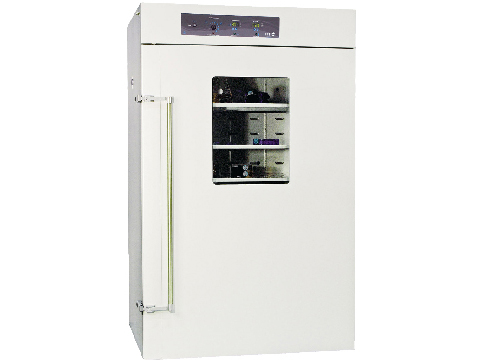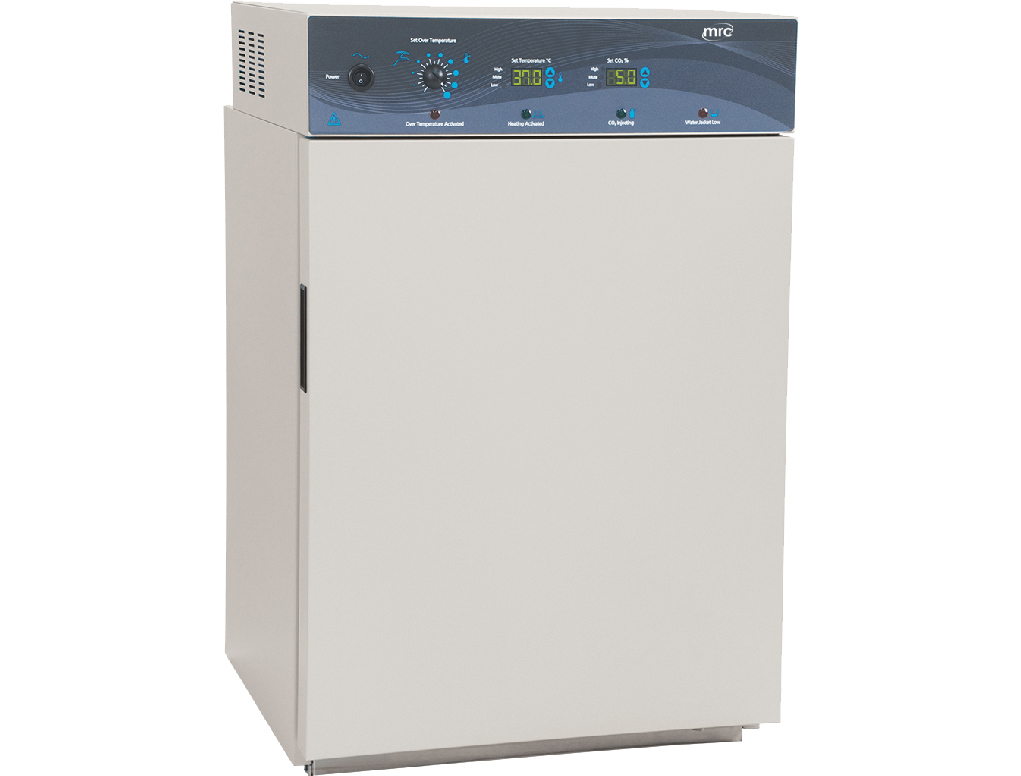A CO2 incubator is a piece of laboratory equipment used to maintain optimal conditions for the growth and development of cells, tissues, or microorganisms. Conditions maintained within an incubator generally include temperature control and carbon dioxide (CO2) concentration regulation. This type of incubator creates an environment that mimics body temperature, and the same level of carbon dioxide found in a healthy human body. They are used for growing cells, tissues, and other types of cultures that must protect from influences such as temperature changes, air presence, or exposure to light or oxygen.
The inside of an incubator is typically lined with shelves that are covered in plastic liners or overlays into which the samples can be placed during processing. These liners protect the samples and contain cavities that allow airflow to pass under or around each sample evenly. The body of the incubator is usually made with non-corrosive stainless steel, so samples are shielded from the damaging effects of moisture and other contaminants that can affect sample quality. CO2 incubators use auto cleaning with UV or heat lamps for sanitation. The optimal temperature inside an incubator is 4 to 50 degrees Celsius.
Types Of Co2 Incubators
The most common types are direct heat CO2 incubators and water-jacketed CO2 incubators.
Direct heat CO2 incubators:
Direct heat CO2 incubators provide almost perfect conditions because they have no moving parts or water bath systems, making them more reliable than other incubators. Although these incubators produce hot air without extra humidity, they are not suitable for applications with high moisture levels. Direct heat incubators are ideal for performing procedures such as lysing and freezing samples, which require removing excess water from samples before freeze drying.
Water-jacketed CO2 incubators:
Water-jacketed CO2 incubators are the most popular type of Laboratory incubator. They are enclosed and come with interchangeable shelves. Water circulates through a hollow chamber to maintain the temperature inside the incubator, so the heat generated by samples is transferred away for cooling efficiently. These types of incubators can be used for cell and tissue cultures, microbial applications, and general research purposes.
Working Principle of Co2 Incubators
Incubators typically use a heat dissipation system with water or oil to regulate temperature. The other option is to use an electrical heating element for temperature maintenance. A compressor and coolant are used to control the humidity inside the incubator. CO2 is added into the incubator at a preset amount which helps maintain optimal conditions for cell development. An atomizer system or a water reservoir keeps the humidity within the incubator constant.
Maintaining the right amount of CO2 levels in the incubator is very important for the proper growth of cells. CO2 is critical for successful cell culture, and maintaining ideal conditions is essential to prevent contamination. The optimal level of CO2 should be in the range of 20-30%.
Determine whether the CO2 incubator is suitable for your research because different incubates used to maintain different conditions. For instance, if you are an embryologist working with human eggs, then a CO2 incubator specifically designed for human embryo research is the best option because it will provide optimal conditions for your samples.
Applications of Co2 incubators In Various Sectors
CO2 incubators are commonly used for cell culture processes in the pharmaceutical industry and medical research labs. For instance, they are often used to maintain the temperature and humidity levels essential for culturing cells in a lab setting. In addition, it can be used to monitor the growth of diverse cell cultures, including stem cells and cancer cells.
- Used for the development of tissue-engineered products. For instance, you can use them to culture 3D cell structures to produce scaffolds for grafting purposes.
- Used in assisted reproductive technology for culturing and maintaining human embryos during in-vitro fertilization. They are also used to control factors such as temperature, CO2 levels, humidity, and pH to maintain optimal conditions for cell development.
- Used for developing biosensors or cell-based sensors. These sensors take a digitally sensitive element and turn it into a signal that can be used to track cell growth and development. It's ideal for various processes, including automating cell-based assays like PCR, ELISA, or biofuel cells.
When purchasing, it is important to consider factors such as cost, performance, usability, and size of the incubator based on your specific application requirements. It is recommended to consult with experts to get advice about the most suitable options for your research needs. The minimum temperature should be roughly 4 degrees Celsius, while the maximum temperature can go up to 50 degrees Celsius. The ideal CO2 concentration levels should stay between 0.3 and 19.9%. The relative humidity of the incubator should be maintained between 40% and 95%, depending on your application needs.
Some essential elements to consider while buying a CO2 incubator are adjustable controls with password protection, temperature alarms, and USB connections. It is also important to consider safety features such as leak-proof seals and rapid cooling systems to protect your samples from damage due to high humidity levels. Other useful features include touchscreens, remote access capability, and auto-diagnostics tools that can help you monitor the performance of your incubator regularly.
Overall, there are many factors to consider when choosing Laboratory Equipment like a CO2 incubator for your lab. Ultimately, it is important to assess your needs and research requirements before purchasing to find the right equipment for your lab.
Best CO2 incubators
1.
EXTRA LARGE CO2 INCUBATOR 1678 LITER
1700 liter co2 incubator
•Accommodates Roller Bottle Apparatus
•Infrared CO2 Sensing Technology
•Viewing Door

2.
LARGE CO2 INCUBATOR 879 LITER
 •Accommodates Roller Bottle Apparatus
•Accommodates Roller Bottle Apparatus
•Infrared CO2 Sensing Technology
•Viewing Door
•Independent Overtemperature Protection
Exterior Dimensions (cm) 100.4Wx85.5Dx191.2H
Chamber Dimensions (cm) 83.1Wx66.0Dx160.0H

3.
CO2 WATER JACKETED INCUBATOR 170 LITER
 CO2 Water Jacketed Incubator 170 liter
CO2 Water Jacketed Incubator 170 liter
•Infrared CO2 Sensor
•Heated Outer Door
•Independent Overtemperature Protection
•Quick Clean Shelf System
